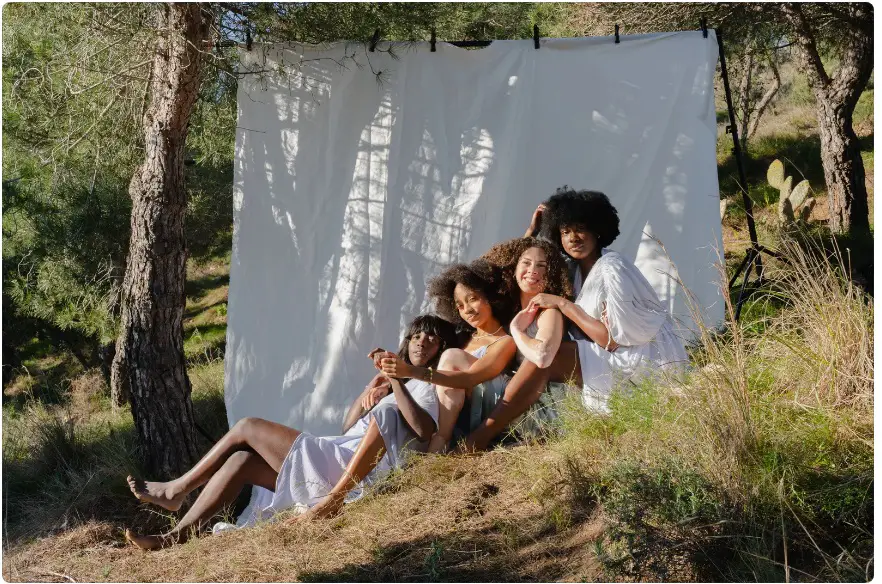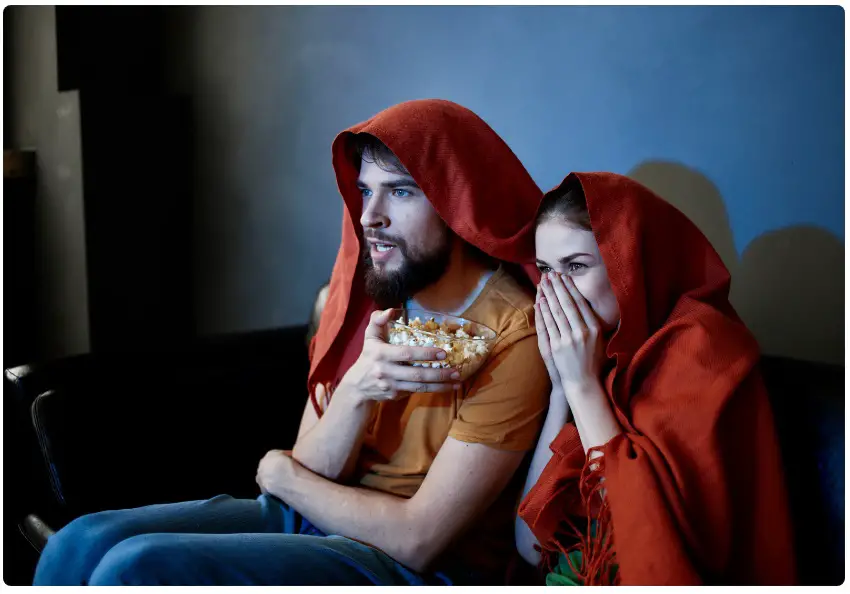Television has been a staple in American households since the late 1940s, revolutionizing the way people consumed media. It quickly became a central form of entertainment and communication for families across the country.
With television’s popularity came its influence on society, including politics and social norms. The medium has served as a platform for historic events such as presidential addresses, cultural phenomena like Beatlemania, and iconic moments like Neil Armstrong’s moon landing.
The advent of cable television in the 1980s also brought about niche programming that catered to specific interests and demographics. As technology continues to advance, so too does our consumption of media.
Streaming services have shaken up traditional broadcast TV networks, but the medium remains an integral part of our daily lives. One genre that has evolved alongside television is reality television shows.
Contents
Defining Reality Television Shows
Reality TV shows are non-fiction programs that depict real-life situations or participants in unscripted or semi-scripted scenarios. These shows typically feature everyday people rather than actors or professional performers.
The format rose to prominence in the late 1990s with early reality TV shows like Candid Camera, which featured hidden camera pranks on unsuspecting individuals. Over time, reality TV evolved into subgenres such as competition-based shows like American Idol and lifestyle-based shows like Keeping Up with the Kardashians.
One defining characteristic of reality TV is its focus on drama and conflict between participants. This often involves edited footage designed to create tensions among cast members or manipulate audience reactions.
While some argue that this sensationalism makes for entertaining programming, others criticize it as exploitative or harmful to mental health. As we explore the evolution of reality TV shows throughout history, it’s important to consider both their cultural significance and their potential impact on participants and viewers alike.
Early Reality TV Shows
Reality television shows have come a long way since the first experimental shows aired in the late 1940s. In the 1950s, Candid Camera took the world by storm with its hidden camera pranks.
It was one of the earliest reality television shows to incorporate filming people’s natural reactions to unscripted situations. The show’s simple yet effective concept paved the way for future reality TV productions.
The Real World, MTV’s groundbreaking show, premiered in 1992 and is considered one of the most influential reality TV shows of all time. The show brought together seven young strangers to live in a house together, with cameras following their every move.
The Real World tackled real-world issues such as racism and sexuality, making it one of the most talked-about and controversial shows on television at that time. Survivor is another early reality TV show that revolutionized the genre as we know it today.
The reality competition series premiered in 2000 and featured contestants stranded on an island competing for a grand prize. Survivor was one of the first shows that merged strategy and physical challenges into a single format, setting a template for future competition-based reality TV series like American Ninja Warrior and RuPaul’s Drag Race.
Competition-Based Reality TV Shows
American Idol
One of the most successful reality television shows of all time is American Idol. This talent competition show first aired in 2002 and quickly became a phenomenon. The show featured singers who competed in front of a panel of judges to win the title of American Idol and a recording contract.
The audience voted for their favorite performers and ultimately chose the winner. The success of American Idol led to many other singing competition shows such as The Voice, X Factor, and America’s Got Talent.
One factor that contributed to the popularity of American Idol was the emotional connection viewers felt with the contestants. The show highlighted each contestant’s unique story, making them relatable to audiences at home.
Dancing with the Stars
Dancing with the Stars is another competition-based reality TV show that has been on air since 2005. Celebrities are paired with professional dancers and compete against one another in various styles of dance. Each week, judges score their routines along with viewer votes to determine who stays in the competition.
One reason for Dancing with Stars’ success is its ability to appeal to a broad audience range. Not only do fans watch for their favorite celebrities, but also for their favorite dance styles showcased throughout each season.
The Voice
The Voice premiered internationally in 2010 before becoming a hit show in America as well. This singing competition features aspiring artists who audition for coaches who mentor them throughout the competition process. Coaches select their team members based purely on vocal abilities during blind auditions and later judge them based on performances during battle rounds and live shows.
The unique aspect about The Voice is that it focuses solely on vocal ability rather than appearance or performance skills like other singing competitions previously mentioned. It allows contestants from different backgrounds an equal opportunity while also showcasing coaches’ talents as mentors beyond just their singing careers.
Lifestyle-Based Reality TV Shows
In the early 2000s, reality TV shows started to shift away from competition-based formats and began focusing on the daily lives of celebrities and ordinary people. These lifestyle-based shows were hugely popular and often featured wealthy or famous people in their natural environments, giving viewers a voyeuristic glimpse into their lives.
Keeping Up with the Kardashians
One of the most successful lifestyle-based reality TV shows is Keeping Up with the Kardashians. The show follows the daily lives of the Kardashian-Jenner family, giving viewers an exclusive look into the glamorous world of Hollywood’s elite.
From fashion shoots to family drama, this show has it all. The show has been criticized for being overly scripted and fake, but there’s no denying its impact on pop culture.
The Kardashian family has become a household name thanks to their reality TV success. They’ve launched successful businesses and built multi-million-dollar empires off the back of their show.
The Real Housewives series
Another popular lifestyle-based reality TV show is The Real Housewives series, which follows affluent women as they navigate life in various cities across America. With spin-off shows set in locations such as New York City, Beverly Hills, and Atlanta, this franchise has become a staple of reality television. The show is known for its drama-filled moments and catfights between cast members.
It’s often criticized for perpetuating negative stereotypes about women and promoting materialism and excess. However, fans can’t seem to get enough of the lavish lifestyles depicted on screen.
Jersey Shore
Taking a different approach to lifestyle-based reality TV shows is Jersey Shore. This MTV hit followed eight young adults spending their summer at a beach house in New Jersey where they partied hard and got into all sorts of trouble.
While not featuring A-list celebrities like other lifestyle-based shows, Jersey Shore became a cultural phenomenon for its portrayal of youth culture and the infamous cast members such as Snooki and The Situation. The show sparked controversy with its depiction of Italian-Americans, but it was also celebrated for its unapologetic portrayal of young adults just having fun.
Overall, lifestyle-based reality TV shows have become a staple of the genre. Whether we’re watching celebrities or ordinary people, these shows offer an escape into a glamorous world that’s both entertaining and addictive.
Docu-Series Reality TV Shows
Reality television shows have evolved over the years, and one of the most popular sub-genres is docu-series reality TV shows. These shows are designed to showcase real-life situations as they unfold, with no script or plot.
They often deal with serious subjects such as addiction, mental health issues, and family dynamics. Here are three examples of popular docu-series reality TV shows:
Intervention
Intervention is a show that aims to help people who struggle with addiction. The show follows addicts and their families as they try to recover from their addiction. The producers of the show work with licensed interventionists who help participants get treatment for their addiction.
The show has been praised for its accurate portrayal of addiction and its impact on families. One reason why Intervention is so successful is that it humanizes the struggles of addicts.
It allows viewers to see the realities of addiction and how it affects not just the person struggling but also their loved ones. It also provides hope by showing that recovery is possible with the right support.
Hoarders
Hoarders is a documentary-style reality TV show that focuses on individuals who struggle with hoarding disorder. Each episode follows hoarders as they try to declutter their homes and get rid of items they no longer need or want. The show sheds light on an often-misunderstood disorder and helps viewers understand why people hoard.
Watching Hoarders can be difficult because it exposes viewers to the extreme conditions in which some people live due to hoarding disorder. However, it also provides education on mental health disorders and how they impact individuals’ lives.
Teen Mom
Teen Mom started as a docu-series about teenage mothers but quickly became a cultural phenomenon due to its honest portrayal of young parents’ struggles. The show follows young mothers as they navigate parenting, relationships, and growing up.
It depicts the harsh realities of being a young parent and the challenges that come with raising children. Teen Mom has been criticized for glamourizing teen pregnancy, but it has also been praised for giving a voice to young parents and showing how difficult it is to raise children while still being a teenager.
The show has become an important tool in promoting sex education and safe sex practices among young people. Docu-series reality TV shows have become increasingly popular due to their ability to showcase real-life situations in an unscripted format.
They provide viewers with insight into the lives of others and help them understand serious issues such as addiction, mental health disorders, and parenting struggles. While these shows may be difficult to watch at times, they are essential in promoting empathy and understanding for those who face these challenges on a daily basis.
Social Media and Reality TV Shows
Social media has been a game-changer for many industries, including reality television. With the rise of social media platforms like Twitter, Facebook, and Instagram, viewers have become more invested in their favorite reality TV shows than ever before. Social media has given viewers the ability to interact with their favorite contestants and even influence the outcome of a show.
For example, on American Idol, viewers can vote for their favorite contestants via text message or through the show’s website. This has led to some surprising results in past seasons, with lesser-known singers winning over more established ones thanks to a strong social media following.
Additionally, social media has given producers and networks valuable insights into how viewers are reacting to certain storylines or contestants. By monitoring hashtags and comments on Twitter and other platforms, they can make adjustments to keep audiences engaged.
Love Island is a British reality dating show that exploded in popularity thanks in large part to its use of social media. Viewers can follow along with the show’s contestants on Instagram and Twitter as they navigate romantic relationships while living together on an island paradise.
Big Brother is another popular reality show that has embraced social media in recent years. Contestants are not allowed access to their phones during filming, but fans at home can stay up-to-date with all the drama by following official accounts for the show on various platforms.
Social media also plays a major role in recruiting contestants for these types of shows. Producers often look for applicants who already have a large following on platforms like Instagram or TikTok since these individuals are likely to attract more viewership.
Overall, it’s clear that social media will continue to shape the future of reality television as we know it. From influencing the outcome of competition-based shows to giving viewers a closer look at the lives of their favorite contestants, social media is here to stay.
The Dark Side of Reality TV Shows
Reality TV shows have come under fire for various reasons, ranging from the exploitation of participants to the negative impact on mental health. While these concerns have been raised before, they continue to persist today and have even led to some shows being canceled. In this section, we’ll take a closer look at some of the criticisms and controversies surrounding reality TV shows.
Negative Impact on Mental Health
Another criticism frequently leveled against reality TV shows is that they can have a negative impact on mental health. The intense pressure placed on contestants to perform well and attract viewers can take a toll on their emotional wellbeing, leading to anxiety, depression, and other mental health issues. In some cases, contestants have reported feeling isolated from loved ones during filming and overwhelmed by the scrutiny they receive from both producers and fans.
While some contestants appear able to cope with this level of stress without issue, others struggle significantly. This has led many critics to call for greater support services for those taking part in reality TV shows or for more stringent regulations governing how these programs are produced.
Manipulation of Storylines
It’s worth noting that many reality TV shows have been accused of manipulating storylines to create more drama and tension on-screen. By selectively editing footage or asking participants leading questions, producers can create a false sense of conflict that doesn’t accurately reflect what actually took place. This has led some viewers to question the authenticity of reality TV shows and whether they are genuinely unscripted.
In response to these concerns, some shows have implemented greater transparency measures, such as releasing unaired footage or providing behind-the-scenes access to viewers. However, many critics feel that more needs to be done to ensure that audiences are not misled by heavily edited footage and misleading storylines.
Conclusion
Evolution of reality television shows over time
Reality television shows have come a long way since the days of Candid Camera. Today, we see a wide variety of shows that cover everything from singing competitions to lifestyle dramas. The format has evolved to cater to different interests and demographics, exploring new concepts and themes for viewers.
One significant change over the years is the shift towards more provocative programming that pushes boundaries and tests social norms. Shows like The Real Housewives series or Jersey Shore have been criticized for their negative impact on society, while others like Intervention or Hoarders are celebrated for raising awareness about serious issues.
Another notable development in reality TV is the influence of social media platforms on show content and audience engagement. Love Island and Big Brother are two examples where fans can interact with cast members and vote on outcomes, making them feel more invested in the show’s outcome.
Future predictions for the genre
As technology continues to advance, it’s likely we will see even more innovation in reality television programming. With virtual reality becoming more accessible, there may be opportunities for audiences to experience what it’s like to be a participant on a show.
Additionally, we may see an increase in international collaborations that will bring together participants from different countries or cultures. This could provide viewers with insights into new perspectives while fostering global understanding.
Despite criticisms surrounding some of these programs’ negative effects on individuals and society at large, there is no denying their popularity among audiences worldwide. Producers will continue to explore new ways to push boundaries while providing entertaining content that captivates viewers’ attention across all borders.




